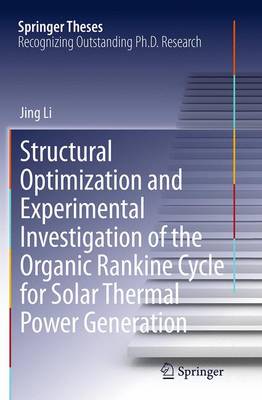Compared to the conventional Rankine cycle using water, the ORC can create efficient expansion at low power, avoid superheater and offer higher thermal efficiency in low temperature application. Small-scale ORCs from several kWe to a few hundred kWe offer great potential for meeting the residential demand on heat and power, and are of growing interest in scientific and technical fields. However, one critical problem is the decreased device efficiency and cost-effectiveness that arises when the ORC is scaled down.
In this thesis, the ORC is combined with low concentration-ratio solar collectors. The background, research trend, merits and importance of the solar ORC are described. To reduce the thermodynamic irreversibility and the cost of the system, three innovative solutions are proposed: solar ORC without heat transfer fluid (HTF), which employs two-stage collectors and heat storage units; hybrid solar power generation based on ORC and amorphous silicon cells; osmosis-driven solar ORC. Heat collection, storage and power conversion are optimized. The design, construction and test of a prototype are conducted, demonstrating the feasibility of the ORC for small-scale cogeneration. Special attention is paid to the variable operation and parameter design with respect to the condensation temperature.
- ISBN13 9783662514177
- Publish Date 22 September 2016
- Publish Status Active
- Publish Country DE
- Publisher Springer-Verlag Berlin and Heidelberg GmbH & Co. KG
- Imprint Springer-Verlag Berlin and Heidelberg GmbH & Co. K
- Edition Softcover reprint of the original 1st ed. 2015
- Format Paperback
- Pages 133
- Language English
